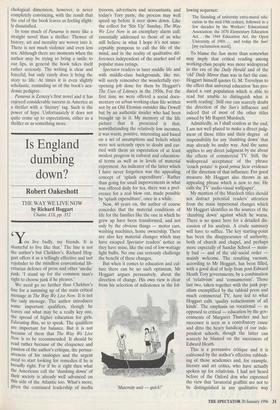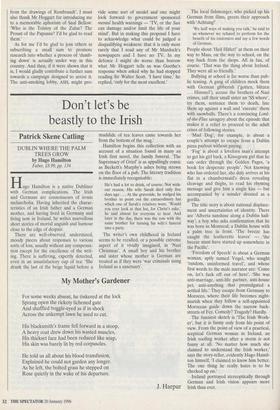Is England dumbing down?
Robert Oakeshott
THE WAY WE LIVE NOW by Richard Hoggart Chatto, £18, pp. 352 You live badly, my friends. It is shameful to live like that.' The line is not the author's but Chekhov's. Richard Hog- gart offers it as a tellingly effective and tart rejoinder to the mindless conventional lib- ertarian defence of press and other 'media' junk: 'I stand up for the common man's right to choose junk if he pleases.'
We need go no further than Chekhov's line for a summing up of the main critical message in The Way We Live Now. It is not the only message. The author introduces some important qualifiers, though he leaves out what may be a really key one, the spread of higher education for girls. Educating Rita, so to speak. The qualifiers are important for balance. But it is not because of them that The Way We Live Now is to be recommended. It should be read rather because of the eloquence and passion of the author's critique, the persua- siveness of his analogies and the urgent need to start looking for remedies if he is broadly right. For if he is right then what the Americans call the 'clumbing down' of their society is already well advanced on this side of the Atlantic too. What's more, given the continued leadership of media tycoons, advertisers and accountants, and today's Tory party, the process may well speed up before it ever slows down. Like the collect for 'Stir Up' Sunday, The Way We Live Now is an exemplary alarm call: essentially addressed to those of us who still believe in what I hope it's not unac- ceptably pompous to call the life of the mind, and in the reality of qualitative dif- ferences independent of the market and of popular mass ratings.
Spectator readers in later middle life and with middle-class backgrounds, like me, will surely remember the wonderfully eye- opening job done for them by Hoggart's The Uses of Literacy in the 1950s. For the first time we were offered a social docu- mentary on urban working-class life written not by an Old Etonian outsider like Orwell but by an authentic insider who had been brought up in it. My memory of the life picture that it presented is that, notwithstanding the relatively low incomes, it was warm, positive, interesting and based on a set of assumptions and beliefs which were not seriously open to doubt and car- ried with them an expectation of at least modest progress in cultural and education- al terms as well as in levels of material enjoyment. An indicator of the latter which I have never forgotten was the appealing concept of 'splash expenditure'. Rather than going for small improvements in what was offered daily for tea, there was a pref- erence for a real blow out, made possible by 'splash expenditure', once in a while.
Now, 40 years on, the author of course concedes that the material conditions of life for the families like the one in which he grew up have been transformed, and not only by the obvious things — motor cars, washing machines, home ownership. There are also key material changes which may have escaped Spectator readers' notice as they have mine, like the end of low-wattage light bulbs. No one can seriously challenge the benefit of these changes.
But when it comes to education and cul- ture there can be no such optimism, Mr Hoggart argues persuasively, about the direction of change. His own view is clear from his selection of milestones in the fol- Maternity unit — quick!' lowing sequence: The founding of university extra-mural edu- cation in the mid-19th century, followed in a few decades by the Workers' Educational Association; the 1870 Elementary Education Act. .. the 1944 Education Act, the Open University of 1969... and today the Sun! [my exclamation mark].
To blame the Sun more than somewhat may imply that critical reading among working-class people was more widespread in the era of the Daily Herald and of the `old' Daily Mirror than was in fact the case. Hoggart himself quotes G. M. Trevelyan to the effect that universal education 'has pro- duced a vast population which is able to read but unable to distinguish what is worth reading'. Still one can scarcely doubt the direction of the Sun's influence and indeed that of most of the other titles owned by Mr Rupert Murdoch.
Admittedly, as I shall confess at the end, I am not well placed to make a direct judg- ment of those titles and their degree of responsibility for any 'clumbing down' that may already be under way. And the same applies to any direct judgment by me about the effects of commercial TV. Still, the widespread acceptance of the phrase `couch potato' is good prima facie evidence of the direction of that influence. For good measure Mr Hoggart also throws in an appealing phrase which is new to me. He calls the TV 'audio-visual wallpaper'.
My mention of the Murdoch titles should not distract potential readers' attention from the main impersonal changes which Mr Hoggart identifies as the sources of the `clumbing down' against which he warns. There is no space here for a detailed dis- cussion of his analysis. A crude summary will have to suffice. The key starting-point has been the disappearance of authority, both of church and chapel, and perhaps more especially of Sunday School — main- ly bad — and of the old •social order mainly welcome. The resulting vacuum, according to Mr Hoggart, has been filled, with a good deal of help from post-Edward Heath Tory governments, by a combination of 'relativism' and 'consumerism'. Those last two, taken together with the junk pop- ulism exemplified by the tabloid press and much commercial TV, have led to what Hoggart calls 'quality reductionism of all kinds'. The emphasis on vocational — as opposed to critical — education by the gov- ernments of Margaret Thatcher and her successor is seen as a contributory cause and ditto the heavy handicap of our inde- pendent schools, though the latter can scarcely be blamed on the successors of Edward Heath.
This is a persuasive critique and it is enlivened by the author's effective rubbish- ing of those academics and, for example, literary and art critics, who have actually spoken up for relativism. I had not heard before of the Oxford don who expressed the view that lavatorial graffitti are not to be distinguished in any qualitative way from the drawings of Rembrandt'. I must also thank Mr Hoggart for introducing me to a memorable aphorism of Saul Bellow: `Who is the Tolstoy of the Zulus? The Proust of the Papuans? I'd be glad to read them.'
As for me I'd be glad to join others in subscribing a small sum to promote research into whether a process of 'dumb- ing down' is actually under way in this country. And then, if it were shown that it is, I would gladly contribute a further sum towards a campaign designed to arrest it. The anti-smoking lobby, ASH, might pro- vide some sort of model and one might look forward to government sponsored mental health warnings — 'TV, or the Sun can damage and/or limit the life of your mind'. But in making this proposal I have to acknowledge what could be judged a disqualifying weakness: that it is only most rarely that I read any of Mr Murdoch's newspapers and I have no TV. In my defence I might do worse than borrow what Mr Hoggart tells us was Goethe's response when asked why he had stopped reading Sir Walter Scott. 'I have time,' he replied, 'only for the most excellent.'



























































 Previous page
Previous page